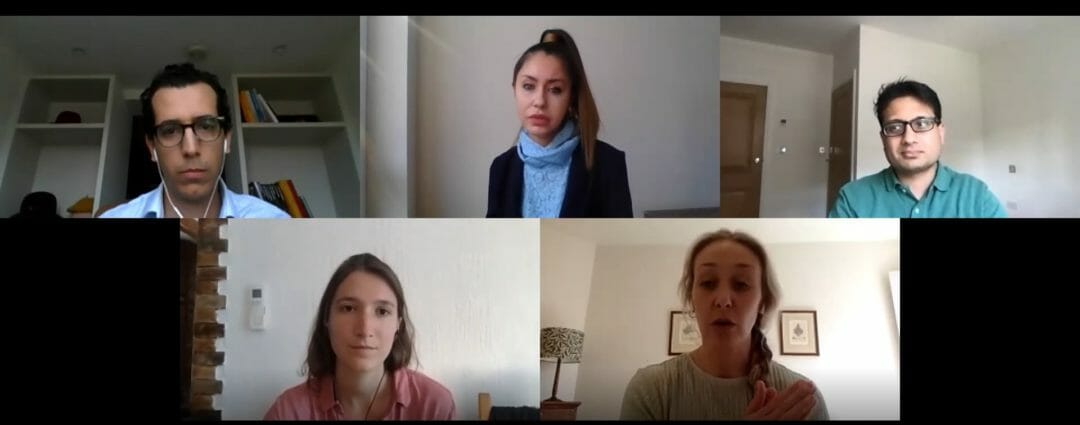As the UK prepares for the next phase of lockdown, leading venture capital investors and micro-mobility unicorn, Lime, shared their views on urban life innovations in the sectors most affected by coronavirus — retail, real estate, travel and urban mobility.
In the latest ‘Ecosystem’ webinar series, the speakers discussed the role of technology in building resilient city infrastructure in a post pandemic world — a very timely conversation led by Tzvete Doncheva, just as the UK government announced a £2 billion package to help increase cycling and walking capacity across the country over the weekend.
The panel opened with a broad agreement on the change in the later stage VC market across most sectors; the cost of capital will be higher than before with investors placing more emphasis on startup profitability over growth.
Leading VCs discuss the future of innovation in a post Covid-19 world
Real estate and retail
One of the most impacted industries by the coronavirus pandemic is real estate and retail.
“The asset class which will be most affected is retail which was already in a challenging position to begin with and then office,” said Roelof Opperman, managing director at Fifth Wall, a venture capital firm focused exclusively on real estate technology.
He added the trends to watch in PropTech (and retail) will be touch-less access control, HVAC and filtering systems, robotic cleaning and platforms facilitating the communication between landlords and tenants.
He explained: “For every real estate player and I think [for] most corporates, digitalisation went from priority four or five to priority number one. The challenge is the willingness to spend.
“Overall we will see five to ten years’ worth of progress in certain areas in real estate tech and innovation in the next six to 12 months, because of all that is happening in the space and how hard it has been hit. And in addition to this, the ‘forced experiment’ of working from home — it’s not about coronavirus changing anything but it accelerates everything.”
Another VC investor who took part as a speaker was Manu Gupta, general partner at Lakestar, one of the leading European venture capital firms that partners with exceptional tech entrepreneurs worldwide. He highlighted the resilience of residential real estate.
The smart nation: Singapore’s citizen-centric drive
Travel and urban mobility
Urban mobility and transportation are two sectors where a lot of tech companies have seen revenues drop dramatically, in some cases to near zero.
“Demonstrating a rigorous pivot in these times really illustrates the type of resilience that you’d like to see as a VC investor,” said Emilie Hannezo, an associate at InMotion Ventures, Jaguar Land Rover’s VC fund, where she invests in the future of mobility, transportation and travel.
She highlighted their portfolio company Zeelo, an on-demand coaching service that successfully pivoted its services to transport key critical workers, winning major contracts with companies such as Amazon, and taking extensive measures to ensure drivers’ and passengers’ health and safety.
Market leaders such as Lime and Airbnb were also taken a back.
“In the short term it hit us pretty hard. As lockdowns were implemented across Europe, our number of journeys fell dramatically and in an effort to help people stay safe and stay put, we paused operations in all but South Korea,” admitted Florence Milner, GM UK and Ireland at Lime.
Gupta also pointed out that the big players will be the ones to come out as winners –liquidity and people’s perception of quality gravitates towards them.
For example, the panelists mentioned Airbnb’s balance sheet will enable it to weather a storm not only for 12-24 months, but likely for indefinite periods of time. It was also noted that the market leaders will be able to make opportunistic acquisitions at cheaper valuations of companies.
Lime’s latest funding round, led by Uber was announced on the day of the ‘Ecosystem’ webinar. The company also pivoted to provide key workers support initially and is now shifting operations to serve urban travellers best in the new ‘normal’ — one where the public and private sector must work together to maintain the shift away from car usage, a return to which could have damaging effects both to the economy and the environment.
“We are seeing encouraging steps across the world from governments, bolstering the offering for pedestrians and cyclists. However with governments warning people to avoid public transport and capacity falling to around ~20% by some estimates, there is a risk for people to revert to personal car usage,” continued Milner.
She also highlighted as people’s modes of commuting are changing, this may also affect their gravity towards urban city centres, which in turn can lead to a real shift in the way micro mobility is used — taking up the entirety of a journey rather than solely as a first/last mile solution.
The panelists agreed that the level of uncertainty is still too high to accurately predict how urban life will develop in the future. It will greatly depend on whether city authorities would like to retain this car-free order by focusing on alternative modes of transportation.
“Road space was turned into bicycle lanes in a couple of days instead of years. Urban life has become more pedestrian- and soft mobility-friendly. We assume that some of those measures might remain in place after the crisis. Public transport is not going to just shut down, as it’s a vital link in our lives. But they will have to be able to assure passengers’ safety. Now more than ever the world really needs to find these types of unprecedented solutions to match with the circumstances that we’re in,” added Hannezo, who said she’d be looking more into sustainability, electrification start-ups which promote this kind of improvements in cities.
VC advice to entrepreneurs, tech startups and SMEs looking to survive the coronavirus-led economic slump
The success of urban life innovations
Collaboration between the public and the private sectors is essential for the advance of urban life innovations and helping to develop the resilient future cities.
The webinar was also joined by Jess Williamson, PropTech strategist at The Ministry of Housing, Communities and Local Government who asked the panel an insightful question on a policy or innovation they’d implement had they been given a magic wand.
According to Roelof, the amount of power the councils have is a challenge for property developers and the extensive bureaucracy in place is holding back a lot of building.
As we are developing the future cities, we should ensure they are inclusive and constructed from and for the entire population they are to serve, at both a funder and founder level.
“There’s a top of the funnel issue with not enough female entrepreneurs in general. The conversion ratio is very little from the first deck that you see to an investment,” continued Hannezo.
Commenting on the need for greater collaboration with more diversity and inclusivity, Doncheva, a startup mentor who previously led the ecosystem initiatives at a London-based proptech venture capital firm, added: “Only 20% of pitch decks the VC industry receives come from mixed gender teams. The systemic issue of female under representation in VC teams, pipelines and investments needs to be addressed so that future innovations do not hold gender-specific biases.”










